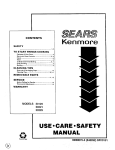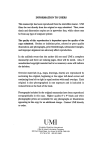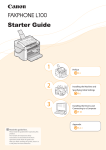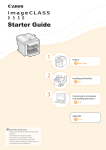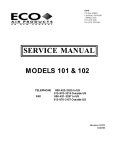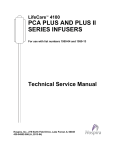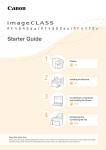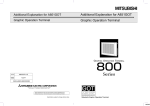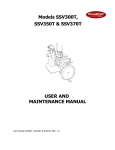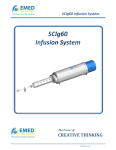Download Abbott 4100 PCA+ II
Transcript
9T LifeCare@ 4100 : PCA PLUS II Infuser With Microgram Delivery IJ For use with list 1950-04 System Operating Manual a Abbott Laboratories North Chicago, IL 60064 USA 430-04501-BOZ(Rev. 10/96) Contents Contents Section 1 INTRODUCTION . . . . USER QUALIFICATION’ : : : : : : : : : : : : : : : : : : : : : : : : l-l l-1 Section 2 PRINCIPLES OF OPERATION . . . . . . . . . . . . . . . . . . . . . . . . 2 -1 Section 3 EQUIPMENTDESCRIFFION ........................ COMPONENTS FRONTPANEL TO&-HSWiTCFiES- : : : : : : : : : : : : : : : : : : : : [PURGESYSTEMI. ........................ hO;;LOROSEI . . . . . . . . .. . . . . . .. . . . . 3-1 3-l 3 -4 3-4 . . . 3-4 3-4 -4 3 -4 3-4 3 -5 3-5 3-5 [REVIEW/CHANGE] : : : : : : : : : : : : : : : : : : : : : : : : 3 KJP/DOWNARROWSl ....................... [ONI. ............................. [OFFiRECHGl .......................... [SILENCE/NO1 .......................... [RESET/START] ......................... [PRINT] [HISTORY]’ : : : : : : : : : : : : : : : : : : : : : : : : : : : DISPLAYS iiD, : : : : : : : : : : : : : : : : : : 3 -6 LIQUID CRYSTAL DISPLAY LIGHT-EMITTING DIODE (LED) DISPLAY ............... POWER SOURCE INDICATORS ................... :I: 3-6 3-6 3-7 Section 4 INSTRUMENT INSTALLATION PROCEDURE .................. UNPACKING ............................ INSPECTION INFUSERSELF-TEST ’::::::::::::::::::::::::: SETUPPROCEDURE. ......................... .... SETUP ... VIAL CRADLE ASSEMBLIES. : : : : : : : : : : : : : : : : : : : : ATTACHING PCA SET TO PATIENT ACCESS DEVICE ............. 4-1 4-1 4-1 4-1 4-2 4-2 4 -2 4-3 Section 5 OPERATING THE INFUSER . 5-1 WARM-STARTVS. COLD-START :::::: :::::: : : : : : : : : : 5-1 PURGING THE SYSTEM 5-2 PROGRAMMINGTHEPCAPiUSI&FiJSER :-: : : : : : : : : : : : : : : 5-3 DRUG AND CONCENTRATION 5-3 INTRAVENOUS PCA ADMIMSTRiiI~N’ : : : : : : : : : : : : : : : 5 -4 EPIDURAL PCA ADMINISTRATION . . . . . . . . . . . . . . . . . 5 -4 LOADINGDOSE . . . . . . . . . . . . . . . . . . . . . . . . . 5-7 MODESOFDELIVERY . . . . . . . . . . . . . . . . . . . . . . . 5-7 THE4HRDOSELIMIT. . . . . . . . . . . . . . . . . . . . . . . . . 5-9 STARTING INFUSION . . . . . . . . . 5-10 .: : : : : : : : : : : : : : PCAMODE . . . . . . . . . . . : S-10 L&Care 4100 Series iii 430-04501A02 (Rev. 5/94) Contents S-10 5-10 5*-11 5-11 5-11 5-11 5-12 5-14 5-14 5-15 5-16 CONTINUOUS MODE ...................... PCA+CONTINUOUS MODE .................... STOPPING INFUSION ........................ CHANGING INFUSER SETTINGS CHANGINGSETTINGSDURINGSFiUi : : : : : : : : : : : : : : : : : CLEARING DOSE HISTORY ...................... CHANGING SETTINGS AFTER SETUP .................. CHANGING TIME AND DATE ................... SERVICE MODE SELECTIONS ................... RETAINING THE SETUP ....................... HISTORYANDEVENTLOG ...................... Section 6 . . . . MESSAGES AND ALARMS ........................ STATUS MESSAGES INFUSERALARMSYSTbi : : : : : : : .............................. SILENCING AN ALARM ..................... Section 7 OPERATIONAL PRECAUTIONS Section 8 CLEANING THE INFUSER . 7-1 ...................... . 8-l ........................ Section 9 . . . . BATTERY OPERATION AND MAINTENANCE ................. SWITCHOVER ........................... OPERATING TIME ......................... RECHARGING ........................... Section 10 Section 11 11-1 ...................... Section 12 .... .... ADMINISTRATION EQUIPMENT ADMINISTRATION SETS FOR INTRAVENOUS, EPIDURAL USE .................. EPIDURAL CATHETERS ..................... PCA DRUGS FOR INTRAVENOUS, EPIDURAL USE ........... Section 13 12-l 12-l 12-l 12-l 13-1 WARRANTY .............................. 430-04501 -A02 (Rev. 5194) 9-1 9-1 9-1 9-l 10-l SPECIFICATIONS ............................ PRESCRIPTION DELIVERY LIMITS 6-1 6-1 6-1 6-2 iv System Operating Manual Figures Figures Figure 3-l. Front Panel . . . . . . . . . . . . . . . ........... . 3-l Figure 3-2. Rear Panel . . . . . . . . . . . . . . . ........... . 3-2 Figure 3-3. Vial Cradle Assembly ........... ........... . 3-3 Figure 5-l. Warm-Start Sequence ........... ........... . 5-1 Figure 5-2. Cold-Start Sequence ............ ........... . 5-2 Figure 5-3. Purging the System . . . . . . . . . . . . ........... . 5-3 ..... ........... . 5-6 ........ ........... . 5-7 Figure 5-6. Accessing the Three Delivery Mode Display Screens ........... , 5-8 Figure 5-7. Programming ........... . 5-8 .... ........... . 5-8 PCA+Continuous Delivery . . . . ........... . 5-9 Figure 5-4. Programming Drug and Concentration Figure 5-5. Programming a Loading Dose PCA-OnIy Delivery ....... Figure 5-8. Programming Continuous-Only Delivery Figure S-9. Programming Figure 5-10. Clearing Dose History and Total Delivered .............. 5-11 Figure 5-11. Changing Therapy Settings .................... 5-13 Figure 5-12. Screens for Changing Time and Date ................ 5-14 Figure 5-13. Retaining the Setup ....................... 5-15 Figure S-14. Sample History Printout (in PCA+CONTINUOUS Mode) ......... 5-17 1 I 0 Copyright 1996 Abbott Laboratories All Rights Reserved This document and the subject matter disclosed herein are proprietary information. Abbott Laboratories retains all the exclusive rights of dissemination, reproduction, manufacture and sale. Any party using this document accepts it in confidence, and agrees not to duplicate it in whole or in part nor disclose it to others without the written consent of Abbott Laboratories. LifeCare 4100 Series v 430-04501-802 (Rev. 10/96) Section 1 INTRODUCTION The LifeCare PCA PLUS II infusion pump system is designed for safe, effective. ardgesic delivery to patients through the intravenous or epidural routes in a wide range of clinical settings, including ICU. CCU, SICU, trauma units, bone marrow transplant centers, bum units, oncology centers. and medical/surgicaI nursing units. This operating manual provides: 0 Overview of pump operation a Complete setup and programming instructions 0 Description of alarm and status message systems USER QUALIFICATION The LifeCare PCA PLUS II Infuser is for use by licensed physicians or Iicensed/certified healthcare professionals who are trained in the use of the infuser and in the administration of medical fluids. Use of the LifeCare PCA PLUS II Infuser by other than physicians or health care professionals should only be undertaken following proper instruction, training, and qualification of the user. LiieCare 4100 Series l-l 430-04501-002 (Rev. 10/91) Section 2 PRINCIPLES OF OPERATION The LifeCare PCA PLUS II Infuser is a portable infusion pump that allows a patient to self-administer analgesia within programmed limits. GeneraIly. a nurse following a physicians order programs the infuser with operating parameters, which may include the following: P Loading dose cl PCA dose cl Lockout interval 0 Rate of continuous flow 0 4 hr dose limit 0 Delivery mode setting, i.e.. PCA, CONTINUOUS, or PCA+CONTlNUOUS setbing. The Operating parameters are set from a choice of drug concentration and dose loading dose and 4 hr dose limit are optional. This programming flexibility allows the physician to tailor an effective pain management program unique to each patient. (PCA mode), to The PCA PLUS II infuser can be programmed to deliver either PCA doses deliver only a continuous background infusion with no PCA doses permitted (CONTINUOUS mode), or to deliver a continuous rate and allow PCA doses (PCA+CONTINUOUS mode). Analgesic drugs may be delivered through LifeCare PCA Plus II Infuser intravenously by any of the three modes specified above. In addition, Preservative-Free Morphine Sulfate Injection, USP, or other approved analgesic drugs can be adnrinistered epidurally through a recommended Low Priming Volume PCA Set without a Y-adapter. The epidural route can be used to provide analgesia by any of the three modes of infuser operation. A “lockout” interval controls the frequency with which a patient may receive a PCA dose of analgesia. If the infuser is set in the PCA or PCA+CONTlNUOUS mode, the patient may request a bolus of analgesia during therapy by pressing a button on the patient pendant, causing the infuser to release the specified bolus of analgesia into the IV line. After PCA dose delivery. the patient cannot receive any additional patient requested boluses until the lockout interval has elapsed. The PCA PLUS II Infuser records therapy settings and up to 200 “events” that may occur during the therapy regimen. Events recorded include number of PCA doses requested, number delivered, opening or closing of the security door, start or stop of continuous infusion, an alarm condition, and so on. AlI event descriptions are preceded with time of occurrence (see HZS7DRY AND EVENT LQG, Section 5). The PCA PLUS II operates on AC or battery power. It attaches and locks to an IV pole and also has a locking security door to prevent tampering. The alarm system sounds an audible alarm in the event of a malfunction and digital read-out describes the malfunction. LifeCare 4100 Series 2-l 430-04501-002 (Rev. 10191) Section 3 EQUIPMENT DESCRIPTION COMPONENTS CRADLE RELEASE MECHANISM VIAL UPPER VIAL RETAINER VIAL CRADLE CLIPS SECURITY DOOR DOOR LOCK \ \ / ! t RETAINER I I I INJECTOR / INJECTOR FLANGE RETAINER 1 FRONT PANEL TOUCHSWITCHES 9404AW2 Figure 3-1. Front Panel LieCare 4100 Series 3-l 430-04501 -A02 (Rev. 5194) Section 3 EQUIPMENT DESCRIPTION AUDIBLE ALARM SWlTCH @-WAY) PRINTER CONNECTOR PATlENT PENDANT CABLE JACK PATIENT PENDANT CABLE FASTENER UNIVERSAL IV POLE CLAMP WlTH DUAL-LOCK TM (NOTE: POLE CLAMP IS LOCKED WHEN SECURITY DOOR IS CLOSED AND LOCKED. UNIT CANNOT BE REMOVED FROM IV POLE WITHOUT KEY) KEYS BATTERY ACCESS ’ COVER (SOlTOM PLATE) AC CORD CONNECTOR PATIENT PENDANT CABLE CONNECTOR 9407AOOl Figure 3-2. Rear Panel 430-04501 -A02 (Rev. 5194) 3-2 System Operating Manual COMPONENTS TYPE B TYPE A CRADLE RELEASE MECHANISM \ VIAL BASE \ VIAL STOPPER VIAL LIP LOWiR VIAL RETAINER (SPRING LOADED) LOWER VIAL RETAINER INJECTOR q INJE&OR CAUTION: IMPROPER INSERTION MAY CAUSE VIAL TO CRACK Figure 3-3. Vial Cradle Assembly LieCare 4100 Series 3-3 430-04501-002 (Rev. 10191) Section 3 EOUIPMENT DESCRIPTION FRONT PANEL TOUCHSWITCHES The LifeCare PCA PLUS II Infuser is programmed using the front panel touchswitches shown in Figure 3-1, Front Panel. Note: Active touchswitches produce a short tone when pressed. Inactive touchswitches produce a “flutter” tone when pressed. CAUTION: DO NOT use sharp objects such as pens, scissors, fingernails, etc., to press touchswitches. Such objects may damage touchswitches and cause a malfunction. [PURGE SYSTEM] Removes slack from the system after a new vial/injector is installed (see PURGING THE SYSTEM, Section 5). [LOADING DOSE] Delivers a loading dose during setup and supplemental (booster) doses. [YES/ENTER] Enters a YES response following a YES or NO prompt. Enters a user-selected operating parameter in response to an ENTER prompt. [REVIEW/CHANGE] During setup, allows a review of and, if desired, a change of any previous settings. After setup, when the security door is open, allows total drug delivered and dose history to be cleared, previously entered settings to be changed/corrected, or time and date to be changed. UP/DOWN ARROWS Increases or decreases the numerical value displayed. Pressed and released repeatedly. the numbers scroll one at a time. Holding the touchswitch speeds the scrolhng rate. Brief pauses occur at numerals 5 and 10, and thereafter in increments of 10. [ONI Activates a cold-start if the infuser has been off for more than 60 minutes or if the (OFF/RJXHG) touchswitch was pressed until the background display grid on the LCD disappeared (approximately four seconds). A double audible tone sounds the beginning 430-04501-002 (Rev. 1 O/91) 3-4 System Operating Manual FRONT PANEL TOUCHSWITCHES of the cold-start sequence. Prescription settings, dose history, and event log are not saved in memory and must be entered. Activates a warm-start if the infuser has been off for less than 60 minutes. All prescription settings, dose history, and event log are retained. If the same settings are used, they do not need to be re-entered (see RETAINING ‘INE SETUP, Section 5). No audible tone sounds in the beginning of the warm-start sequence. [OFF/RECHG] Turns the infuser off while retaining prescription settings, dose history, and event log for 60 minutes. A brief audible tone sounds when the infuser is turned off. If pressed and held for approximately four seconds, background grid on the LCD disappears, and prescription settings. dose history, and event log are cleared from memory. When the infuser is plugged into rated AC power, it automatically recharges the battery. The infuser recharges while operating, though at a slower rate than when turned off. For optimum battery life, keep the infuser plugged into an AC power source whenever possible. [SILENCE/NO] Inputs a NO response following a YES OR NO prompt request. Temporarily mutes most audible alarms during an alarm condition. Note: The MALFUNCTION, CHECK VIAL, CHECK INJECTOR, and CHECK SYRINGE alarms cannot be silenced. [RESET/START] Starts or stops infusion in CONTINUOUS or PCA+CONTINUOUS modes after the security door is closed and locked. Note: The [RESET/START) touchswitch is not active in PCA mode. In the PCA+CONTINUOUS mode, patient-activated doses are not permitted until the door is closed and locked and FU?SET/S’Im is pressed. Executes a printout of time and date, parameter settings, dose history, and the event log if optional printer is attached. The event log lists the time and key events that occurred during therapy, such as prescription settings, various alarms, door status, infusion start/stop times, and PCA doses (see HZSZORYAMI EVEiVTWG, Section 5). To use the PRINT function: 0 Connect a Centronics-compatible interface printer cable at the printer port on rear panel. Cl Connect printer cable to printer port on the back of the printer. LifeCare 4100 Series 3-5 430-04501-002 (Rev. 10/91) Section 3 EQUIPMENT DESCRIPTION P Turn on printer power switch... D Press the [PRINTI touchswitch to generate a hard copy printout. Note: To interrupt printing, press the [PRINTI touchswitch. The printing sequence will start at the beginning when the touchswitch is pressed again. [HISTORY] Reviews the therapy parameters entered. Touchswitch must be pressed to advance to the next screen. In approximately 30 seconds. display screen returns to current status display. During operation, displays the therapy parameters, the history of all doses delivered, and the event log (see MSTORY AA!D EVEZVT LOG Section 5). DISPLAYS LIQUID CRYSTAL DISPLAY (LCD) The four-line LCD screen displays messages regarding therapy settings, drug delivered, and alarm and operating conditions. The drug delivered display will record up to 6553.5 milligrams (65535 micrograms) of delivery before rolling over to 0.0 milligrams (0 micrograms). This is recorded in the event log as ROLLOVER 6553.5 MG (or 65535 UG). The LCD features automatic backlighting. This display is lit whenever the security door is open, or during an alarm condition. It remains lit for approximately 30 seconds after the securily door is locked. Backlighting temporarily occurs during touchswitch operation and automatically turns off a&r two minutes of no touchswitch activity. LIGHT-EMITTING DIODE (LED) DISPLAY The four-digit red LED displays critical numerical data. A one-digit “walking” LED on the left side of the display is active during milligram delivery, and a decimal point is lit between the tenth and unit digits. The “walki@’ LED is displayed on the right side during microgram delivery. The LED displays the amount delivered in 0.1 milligram or 1 microgram increments. The LED displays four digits. When the total delivered number exceeds four digits, the highest (f%th) digit is dropped. The LCD displays all five digits. 430-04501-002 (Rev. 1 O/91) 3-6 System Operating Manual DISPLAYS POWER SOURCE INDICATORS Two LED-backlit symbols indicate the source of power: 0 A green power cord plug symbol is lit whenever the infuser is connected AC-power line. tl A red battery symbol is lit while the infuser is operating on battery power. LifeCare 4100 Series 3-7 to a live 430-04501-002 (Rev. 10191) Section 4 INSTRUMENT INSTALLATION PROCEDURE WARNING: PRODUCT DAMAGE MAY OCCUR UNLESS PROPER CARE IS EXERCISED DURING THE UNPACKING AND INSTALLATION PROCESS. THE BAlTERY MAY NOT BE FULLY CHARGED UPON RECEIPT. POSSIBLE INDUCED HAZARDS TO OPERAllNG PERSONNEL OR TO PATIENTS WILL BE DETECTED BY THE INFUSER SELF-TEST. Note: Instrument installation should be performed by qualified personnel only. UNPACKING Use care when unpacking the infuser. Retain the packing slip and save all packing material in the event unit is damaged or fails the infuser Self-Test and has to be returned to the factory. The shipping container should also contain a copy of the System Operating Manual. Note: Two keys are supplied with the infuser and should be accounted for per hospital procedures. INSPECTION Inspect the packing container for possible shipping damage to infuser. Should any damage be found, contact the delivering carrier immediately. Freight claims or insurance Recourse claims must be filed by the receiving party with the carrier within seven days. to the carrier is lost if claim. is not timely. Next, inspect infuser thoroughly for damage. damaged. Do not use infuser if it appears to be INFUSER SELF-TEST Note: Do not place infuser in service until the infuser Self-Test has been conducted. To perform infuser Self-Test, proceed as follows: 1. Unlock and open security door. Hz tiont panel is 2. Plug infuser AC power cord into grounded. hospital-grade 120 VAC. 50-60 receptacle. Ensure that plug symbol to left of LED display on illuminated. LifeCare 4100 Series 4-l 430-04501-002 (Rev. lOI91) Section 4 INSTRUMENT INSTALLATION PROCEDURE 3. Press and release the [ON) touchswitch. The infuser now performs a self-test verifying the integrity of the software, memory, and selected electronic functions. If the infuser fails the test, do not place in service. Contact an Abbott representative for further instructions. 4. To ensure that battery is charged before placing in service, plug AC power cord into hospital-grade 120 VAC and charge battery for 24 hours. SETUP PROCEDURE SETUP Secure the PCA infuser to an IV pole using the Dual-Lock mechanism. Note: When the security door is locked, the infuser is also locked to the pole clamp to prevent removal of infuser without the key. Plug the AC power cord into a grounded hospital-grade AC receptacle for AC-powered operation. If AC power is unavailable, the infuser can be operated on internal battery power. (See Section 9.0, BAmRY OPERATION AND MAINTENANCE. for additional information.) Connect the appropriate compatible Abbott PCA set (see Section 12.0, ADMlMSTRATlON EQUIPMENT, for recommended sets) to an Abbott 30 mL PCAvial/injector. Prime the vial and set by holding it vertically with the administration set extending from the top, and slowly pushing down on the injector until all air is cleared from the vial and the PCA administration set. VIAL CRADLE ASSEMBLIES As shown in Figure 3-3, there are two types of vial cradle assemblies: Type A and Type B. The Type A cradle assembly has a spring-loaded lower vial retainer. In the Type B cradle assembly, the lower vial retainer is an integral part of the assembly and is not spring-loaded. Compare the infuser with Figure 3-3 to determine which type of vial cradle assembly is installed in the unit. To load a vial/injector into the vial cradle assembly, proceed as follows for the appropriate vial cradle assembly: 1. Unlock and open infuser security door. 2. %ueeze cradle release mechanism (see Figure 3-3) and move to the uppermost position (retracted). FOR TYPE A ONLY: Check spring-loaded lower vial retainer (located at the bottom of the vial cradle assembly] to be sure it movesfreely by pressing downward. If the spring-loaded retainer does not movefreely. refer unit to qualz$ed service personnel 430-04501-002 (Rev. 1 O/91) 4-2 System Operating Manual ATTACHING PCA SET TO PATIENT ACCESS DEVICE 3. Place vial lip in lower vial retainer with upper portion of vial tipped toward operator. Gently push vial into cradle assembly clips with slight downward pressure until vial is securely clamped in cradle. CAUTION: Do not load vial into upper vial clip first. Vial lip may crack or chip. 4. Squeeze cradle-release mechanism and slide vial cradle downward until the injector locks firmly in place in the injector flange retainer. 5. Visually verity injector flange is locked in retainer. If flange is not securely locked, repeat steps 4 and 5. 6. Reverify that the viaI is firmly seated against the upper vial retainer. A gap between the vial and upper retainer could cause an under- or delayed-delivery. Eliminate gaps by squeezing the cradle r the injector is locked firmly in 7. thesuch as vial properly in place, gently rotate it 360” and inspect forWith cracks those that may have occurred due to excessive force during insertion. Rotate vial so that the drug/concentration label is visible. lf vial is cracked or broken, remove from the unit and replace with new vial following steps 2 through 7. Dispose of damaged vial per hospital procedures. WARNING: CRACKED VIALS MAY NOT SHOW EVIDENCE OF LEAKAGE UNTIL DELIVERY PRESSURE IS APPLIED. Note: lf the device is off, improper loading of the syringe will turn the unit on and activate a nonsilenceable CHECK SYRINGE alarm within 15 seconds. Proper loading (engaging injector flange) will silence the alarm. WARNING: FAILURE TO USE COMPATIBLE ABBOTT VIAUINJECTOR AND ABBOTT PCA SETS WITH INTEGRAL ANTI-SIPHON VALVE MAY CAUSE AN INACCURATE DOSE DELIVERY TO THE PATIENT. ATTACHING PCA SET TO PATIENT ACCESS DEVICE WARNING: ARRANGE TUBING, CORD, AND CABLES TO MINIMIZE THE RISK OF PATIENT STRANGULATION OR ENTANGLEMENT. For intravenous PCA administration, attach distal end of recommended, primed PCA set to patient access device. Establish flow of primary fluid through primary leg of Y-adapter. For epidural PCA administration, attach distal end of recommended, primed PCA Set without Y-adapter to patient access device. LiieCare 4100 Series 4-3 430-04501.A02 (Rev. 5/94) Section 5 OPERATING THE INFUSER WARM-START VS. COLD-START When the infuser is turned on by either inserting or removing a vial, or by pressing the (ON) touchswitch, it begins a warm-start or a cold-start sequence, depending upon the time elapsed since it was last turned OFF. The infuser initiates a warm-start if it is turned on within 60 minutes of previous use. Ail previous therapy parameters and history information are retained. See Figure 5-1. Warm-Start Sequence, for the sequence of LCD displays that occur during warm-start. , , RAM-OK, TIMER-OK, ROM-OK, CPU-OK, TEST COMPLETE \ r I . ’ am? TIME: AM 9~08 - DATE: FEB 10 91 J / H’STORY AND Rx YESORNO J SILENC NO n YES mmm b 4 t \ COhFlRM TO CLEAR HISTORY AND Rx YESORNO \ YES ENTER .o Figure 5-l. Warm-Start Sequence The infuser initiates a cold-start if more than 60 minutes have elapsed since it was turned off. At that point, most major electronic circuits are turned off, and all therapy settings and dose history are lost. See Figure 5-2, Cold-Start Sequence, for the sequence of LCD displays that occur during a cold-start. Note: The infuser can also be manually placed in the cold-off state by holding the [OFF] touchswitch until the background grid on the &CD disappears (approtimately four seconds). Placing the infuser in the cold-off state is recommended before assigning it to a new patient. When operating on battery power, it is also recommended that the infuser be placed in the cold-off state after use to prolong battery life. L&Care 4100 Series 5-l 430-04501-002 (Rev. 10191) Section 5 OPERATING THE INFUSER +ljiZ&j Figure 5-2. Cold-Start Sequence Note: During a cold-start the infuser performs a self-test verifying the functional integrity of the unit. If the infuser fails the test, the MALFUNCTION alarm is activated and the infuser must be taken out of service. PURGING THE SYSTEM WARNING: PAllENT MUST BE DISCONNECTED FROM THE PCA SET BEFORE THE PURGE CYCLE. To remove system slack when a new vial/injector is installed, it is recommended that the infusion system be purged before beginning operation. Note: The system must be primed prior to purging. Remove all air from the vial before installing into infuser. Note: Drug delivered during the purge cycle is not stored in system memory and will not be displayed. After the infuser is turned on or the vial is replaced, the user is prompted to begin the purge cycle. Con&m the PCA set is disconnected from the patient’s IV line before pressing the (YES] touchswitch to initiate the purge cycle. Press and hold the [PURGE SYSTEM] touchswitch. As soon as fluid is seen at the end of the administration set, release the touchswitch. After about 1.0 mL of fluid is delivered, the purge cycle will stop and the infuser will prompt the user to respond if flow was seen. If ilow was not seen, the cycle can be repeated once (see Figure 5-3, purging the System). In the CONTINUOUS and PCA+CONTlNUOUS modes, if a purge or a loading dose is not performed after a syringe change, the infuser automatically performs a small system compliance step to remove slack when the [RESET/STXRTl touchswitch is pressed (with door locked). 430-04501-002 (Rev. 1 O/91) 5-2 System Operating Manual PROGRAMMING THE PCA PLUS II INFUSER TO START PURGE DISCONNECT PCA SET FROM PATIENT 10 IF 2 ML IS PURGED A + NOTE DRUGS ONLY BRANCH ‘...’ IN FIGURE 54. Figure 5-3. Purging the System CAUTION: Although fluid is not normally delivered to the patient during the compliance step, under some conditions up to 0.3 mL of fluid may be delivered. If 0.3 mL of fluid represents a hazard to the patient, the set should be disconnected during this operation. PROGRAMMING THE PCA PLUS II INFUSER Entering the therapy regimen requires the user to follow the self-prompting displays on the LCD. User responses are entered by pressing the touchswitches. This section describes the various therapy parameters, and contains flow charts outlining the step-by-step procedures for programmin g these parameters into the infuser. DRUG AND CONCENTRATION Drug selection and concentration are the first therapy parameters entered on the screen. One of six screens is selected. Four screens have tied values for drug concentration and two screens can be set by the user (see Figure 5-4, Programming Drug and Concentration). l&Care 4100 Series 5-3 430-04501-002 (Rev. 10131) Section 5 OPERATING THE INFUSER The steps illustrated in Figure 5-4 involve selecting the drug and/or concentration. To change an initial selection, press the [REVIEW/CHANGE] touchswitch. Note: See drug concentration option discussion in CHANGING INFUSER Section, for additional information. SETIINGS. this INTRAVENOUS PCA ADMINISTRATION 0 Connect injector to PCA set and manually prime. cl Attach Main IV set line to recommended PCA set, List 3559, List 6516. or List 6517 attached to List 6514 (with integral anti-siphon valve) via backcheck valve port. Prime IV set and lower portion of PCA set. Close manual clamp on IV set. All drug parameters specified in Figure 5-4 are available for intravenous administration by PCA. EPIDURAL PCA ADMINISTRATION Note: The administration of drugs is restricted to those analgesic drugs approved for continuous epidural administration: Morphine Sulfate Injection, USP (Preservative-Free). Recommended use of the epidural route is for labor and delivery, and for acute pain control or post-operative analgesia for periods up to 96 hours. WARNING: IT IS STRONGLY RECOMMENDED THAT THE EPIDURAL INFUSION SYSTEM BE PROMINENTLY IDENllFlED AS “EPIDURAL.” FAILURE TO IDENTIFY THE INFUSION SYSTEM AS EPIDURAL COULD RESULT IN INCORRECT ADMINISTRATION OF INTRAVENOUS RATHER THAN EPIDURAL FORMULATIONS. IN ADDITION, FAILURE TO IDENTIFY THE EPIDURAL INFUSION SYSTEM COULD RESULT IN CONFUSION WITH OTHER INFUSION SYSTEMS DELIVERING CONCOMITANT INTRAVENOUS FORMULATIONS. Use of the low p riming volume set without Y-injection sites, &ist No. 65 17, is recommended for epidural administration of drugs. Use of a nylon catheter, List No. 1193, or a Teflonm catheter, List No. 6947, is recommended for continuous epidural administration of Morphine Sulfate Injection, USP (Preservative-Free). 0 lf patient access device is not indwelling, prime and establish epiduraIly. Confirm proper placement. 0 Attach recommended low priming volume pump set without Y-injection sites to patient access device. Drug parameters to select: DRUG: Rx Morphine 0.5 mg/mL or Morphine 1 .O mg/mL or DRUG: Rx concentration milligrams/ml, and select 0.5 mg/mL or 1 .O mg/mL. 430-04501-002 (Rev. 1 O/91) 5-4 System Operating Manual PROGRAMMING THE PCA PLUS II INNSER CAUTION: Epidural a-ration of drugs by PCA and/or CONTINUOUS modes should be limited to personnel familiar with associated techniques and patient management problems. Proper epidural placement of the catheter is essential since catheter migration could result in intravascular or intrathecal admini&ration. Facilities practicing continuous epidural administration must be equipped with resuscitative equipment, oxygen, naloxone and other resuscitative drugs. Adequate monitoring equipment, (e.g., oximetry) is recommended for continuous monitoring of the patient during epidural administration. Patients must be observed for side effects frequently in a fully equipped and staffed environment for at least 24 hours following completion of drug admini&ration by the epidural route. DELAYED RESPIRATORY DEPRESSION FOLLOWING CONTINUOUS EPIDURAL ADMINISTRATION OF PRESERVATlVE-FREE MORPBINE SULFATE ELAS BEEN REPORTED. If overdelivery occurs during administration, observe the patient closely for signs of: Cl Compression on spinal cord - disorientation - headache - transient neuralgia D Drug overdose The epidural space has 58 openings through which fluid can exit. Pressure build-up during administration is transient. However, if a large volume of fluid is administered over a short lime period, the pressure will take longer to return to normal. LifeCare 4100 Series 5-5 430-04501-002 (Rev. 10/91) Section 5 OPERATING THE INFUSER 0A Rx MORPHINE Rx MORPHINE SMG/ML? YESORNO < f / No 4 DRUG: Rx MDRPHINE 05 MGfML 3 YESORNO \ , No Rx MEPERIDINE lOMGML? YESORNO L YESORNO 0.1 TO 10.0 MILUGRAMB’ML MlCROGRAMML? YESORNO \ 1 TO 100 MICROGRAMYML IF UG, MG OPll0N:--+@ Figure 5-4. Programming Drug and Concentration 430-04501-002 (Rev. 1 O/91) 5-6 System Operating Manual PROGRAMMING THE PCA PLUS II INFUSER Note: The following pages show programming in milligrams. lf microgram delivery is selected, subsequent prompts will be for microgram values. LOADING DOSE After the drug and concentration have been set, an optional loading dose may be programmed to provide an immediate bolus to the patient (see Figure 5-5, Prog * g a Loading Dose). Note: A supplemental (booster) dose can be delivered at any time during operation by opening the door and pressing the (LOADING DOSE] touchswitch. If the 4 hr dose limit is set and has been reached, using the loading dose function may result in exceeding the dose limit. ID Figure 5-5. Programming a Loading Dose MODES OF DELIVERY The PCA PLUS II Infuser delivers analgesia in one of three modes (see Figure 5-6, Accessing the Three Delivery Mode Display Screens). 0 PCA 0 CONTINUOUS 0 PCA+CONTlNUOUS In the PCA mode, the infuser administers a bolus of medication only at the patients request provided the lockout interval is not in effect and the dose limit has not been exceeded. In the CON’HNUOUS mode, the infuser delivers at a pre-set continuous rate, but does not allow the patient to request a PCA dose. In the PCA+CONTlNUOUS mode, the infuser delivers at a pre-set continuous rate and also permits the patient to receive PCAdoses when requested. provided the lockout interval is not in effect and the 4 hr dose limit has not been exceeded. LifeCare 4100 Series 5-7 430-04501-002 (Rev. 10/91) Section 5 OPERATING THE INFUSER 0 ;T SELECT MODE PCA ONLY ? YESORND SELECT MODE PCA+CONllNlKXJS YESORNO (FIGURE 57) (FIGURE %9) (FIGURE 19) Figure 5-6. Accessing the Three Delivery Mode Display Screens See Figures 5-7. Programming PCA-Only Delivery, 5-8, Programming Continuous-Only Delivery, and 5-9, Programming PCA+Continuous Delivery, for programming procedures for each mode. 4fbOSELfMIT: SET? YES OR NO Figure 5-7. Programming PCA-Only Delivery 0F CONTINUOUS RATE: 4 HR DOSE LIMlT: TOSETlJSEt+ XX-X MG/HR PRESS ENTER r 4 HR DOSE LIMlTz TO SET USE 44 XxX.X MG PRESS ENTER YES OR NO # \ I It SILENC NO YES ENTER n-7 \ J J- CONT SE’lTlNGS: TO CONFIRM ’ YES ’ PRESS HISTORY Q ENTER + THEN LOCK DCOR .o\ ,. SEITINGS DISPLAYED Figure 5-8. Programming Continuous-Only Delivery 430-04501-002 (Rev. 1 O/91) 5-8 System Operating Manual THE 4 HR DOSE LIMIT CONTINUOUS RATE TO SET USE 44 XX.X MG/HR PRESS ENTER + / \ PCA+CONT. SETTING TO CONFIRM PRESSHISTORY THEN LOCK DOOR 4 HR DOSE LIMIT: TO SET USE t + XXX.X MG PRESS ENTER J Q HISTORY SEllNGS DtBPlAYED Figure 5-9. Programming PCA+Continuous Delivery THE 4 HR DOSE LIMIT The 4 hr dose limit is a physician-prescribed value that serves to limit the total dosage that can be delivered in any four-hour period. This optional feature provides added safety to limit the dosage drug delivered in all delivery modes. When the sum of all doses (PCA dose and continuous dose) in the rolling four-hour period equals or exceeds the 4 hr dose limit, patient requests for boluses are unsuccessful and 4 HB LIMIT REACHED message appears. In the CONTINUOUS or PCA+CONTINUOUS mode, the infuser switches to a KVO rate of 0.1 ml&r when the 4 hr dose limit is reached, and the 4 HR LIMIT REACHED message appears. In the PCA mode, the 4 HR LIMIT REACHED message appears. As the oldest dose ages out of the four-hour dose record, the infuser will again accept patient-initiated dose requests (PCA and PCA+CON’I’lNUOUS modes) and resume infusion at the continuous rate in the CONTINUOUS and PCA+CONIlNUOUS modes. Note: A loading dose is included in the 4 hr dose limit calculation ONLY if it is administered after the 4 hr dose limit has been programmed. If the loading dose is administered during initial setup, it will not be included in the 4 hr dose limit. The loading dose is always included in the total dose delivered. Note: As the dose delivered reaches the 4 hr dose limit, a full PCA dose will still be delivered even if it results in exceeding the 4 hr dose limit (e.g., if the 4 hr dose limit is 20 mg. the total delivered is 19 mg, and the patient requests a PCA dose of 3 mg, the full PCA dose will be delivered even though it exceeds the dose limit by 2 mg). ln this example, the LifeCare 4100 Series 5-Q 430-04501-002 (Rev. 10/91) Section 5 OPERATING THE INFUSER 4 hr dose limit message appears during the PCA dose: however, the PCA dose will continue to completion. Note: A loading (booster) dose can be delivered anytime during setup or operation, even if the 4 hr dose limit is already reached or will be exceeded after delivery. Note: Setting a new 4 hr dose limit will not erase the previous 4 hr dose history. To erase the 4 hr dose limit data, turn the infuser off and on, and press (YES] when the CONFIRM TO CLEAR HISTORY AND Rx screen appears before changing the concentration iiom microgram to milligram or vice versa. STARTING INFUSION Note: See DISPLAYS. Section 3. for important information about the drug delivered displays. Note: ln all modes of operation, a repetitive “walkingw LED symbol indicates delivery in progress. PCA MODE A patient-initiated PCA dose can be administered using the patient pendant when the three-asterisk message ( l **) appears. After completing the dose, the infuser enters either the preset lockout interval or the 4 HR LIMIT REACHED state (if a dose limit has been selected): further delivery is prohibited in both of these conditions. The [RESET/STm touchswitch is inactive in the PCA mode. CONTINUOUS MODE Infusion is started by pressing [REsET/STm after the door is closed and locked. The patient pendant is disabled in the CONTlNUOUS mode. Upon reaching the 4 hr dose limit, if selected, the infuser switches to a KVO rate of 0.1 mL/hr, and the 4 HR LIM REACHED message is displayed. PCA+CONTINUOUS MODE Infusion is started by pressing the [RESET/STARTl touchswitch after the door is closed and locked. The patient-initiated doses are permitted if infuser is displaying the three-asterisk message ( ***) (after [ RESET/STARTJ is pressed). When the patient-initiated dose is activated, the PCA dose is dehvered in addition to the continuous infusion rate. After the PCA dose is completed, the infuser enters either the lockout interval or the 4 HR LlMIT REACHED state (if selected). While in the lockout period, the continuous infusion remains in progress, but the patient-initiated dose cannot be activated. In the 4 HR LlMlT REACHED state, the infuser switches to a KVO rate of 0.1 mL/hr. Note: In CONTINUOUS or PCA+CONTlNUOUS mode, if the [RESET/STARTJ touchswitch is not pressed within five minutes, the unit will alarm. 430-04501-002 (Rev. 1 O/91) 5-10 System Operating Manual STOPPING INFUSION STOPPING INFUSION To stop an infusion in the PCA mode, close the slide clamp, open the door, and press the [OFF/RECHG] touchswitch. To stop infusion in the CONTINUOUS or PCA+CONTlNUOUS mode, close the slide clamp and press the [RESET/STARTJ touchswitch or open the door and press the (OFF/RECHG] touchswitch. Note: If in reset for longer than five minutes without pressing an appropriate touchswitch. theunitwillalarm. CHANGING INFUSER SETTINGS Infuser settings can be changed during setup or operation by using the [REVIEW/CHANGE] touchswitch. If changing a setting during operation (CONTINUOUS or PCA+CONTlNUOUS modes), press RESET before opening the security door. CHANGING SETTINGS DURING SETUP During setup, simply press [REVIEW/CHANGE] to change a setting. Each time [REVIEW/CHANGE] is pressed, the message display will revert to the previous setting, until the first setting is displayed. CLEARING DOSE HISTORY Press the IREVlEXV/CHANGEl touchswitch once to display the CLEAR screen. Press [YES] to clear dose history and the total delivered value from memory (see Figure 5- 10, Clearing Dose History and Total Delivery). Pressing IYES] does not clear 4 hr dose limit data. To clear 4 hr dose limit data, turn the infuser off, then on, then press IyES] to the CONFIRM CLEAR HISTORY prompt. Note: Clearing dose history (see Figure 5- 11, Changing Therapy Settings) will also clear the last 24 hour and the last hour totals. Data shown reflects cumulative history since the last clear dose history event. IF VOLUME # OH CLEAR 3 DOSE HISTORY AND TOTAL DELIVERED YES OR NO SILENCE NO n J (IF PLUME = 0) I (MODE) SETlING TO CONFIRM PRESS HISTORY THEN LOCK DOOR I (FIGURE 5-l 1) Figure 5-l 0. Clearing Dose LiieCare 4100 Series Histoy and Total Delivered 5-11 430-04501-002 (Rev. lOI91) Section 5 OPERATING THE INFUSER CHANGING SETTINGS AFTER SETUP After setup is complete, press the [REVIEW/CHANGE] touchswitch once, then press [NO] in response to the CLEAR screen. The CHANGE? screen is now displayed (see Figure 5- 11, Changing Therapy Settings). Note: If the concentration is changed from milligram to microgram, or vice versa, total delivered, 24-hour dose history, and loading dose data will be erased. However, the 4 hr dose limit data will not be erased, which may result in a delay of up to four hours in resuming delivery of chug in all operating modes. To erase the 4 hrdose limit data, turn the infuser OFF and ON, and press (YES] when the CONFlRM TO CLEAR HISTORY AND Rx screen appears before changing the concentration from microgram to milligram or vice versa. 430-04501-002 (Rev. 1 O/91) 5-12 System Operating Manual CHANGING SEITINGS AFTER SETUP DDSE HISTORY AND TOTAL DEUVERED 0HI IF DRUGS ONLY OPTION SELECTED OR DRUGS, UC, YG OPTION SELECTED (IF “OLUIME * r-l CHANGE ? ANY SEl-llNGSz/ MODE YES OR NO I , IF UG. MG ONLY OPTION SELECTED (FlGURE 5-4) J (FIGURE 5-12) (FIGURE 57) l (FIGURE 59) (FIGURE 5-9) (FlGURE 5-Q) I YES OR NO (FIGURE 5-7) (FlGURE S-9) l THIS SCREEN DOES NOT APPEAR WHEN THE INFUSER IS SET IN THE CONTlNUOUS-ONLY MODE. * THIS SCREEN DOES NOT APPEAR WHEN THE INFUSER IS SET IN THE PCA-ONLY MODE. (MODE) SElTlNG TO CONFIRM PRESS HISTORY THEN LOCK DDOR SElllNGS DISPLAYED Figure 5-l 1. Changing Therapy Settings LifeCare 4100 Series 5-13 430-04501.A02 (Rev. 5194) Section 5 OPERATING THE INFUSER CHANGING TIME AND DATE To change the time and date, press [REVIEW/CHANGE], press [NO] at the CLEAR prompt, and again at the CHANGE? prompt. This advances the display to the screens for changing time and date (see Figure 5-12, Screensfor Changing Time and Date). DOBE HLBTGRY AND TGTAL DELIVERED ANY SEmNGw AFFER 6 SECONDS OF NO TOUcHSWlTCH ACTIVITY DATE: FEB109l DATE FEB109l USE t4 OR CHANGE PRESSING REVIEWCHANGE ADVANCES (MODE) SElllNG TO CONFIRM PRESS HIBTORY nME: AM 0959 DATE: FEBlO9l (MODE) SRTlNG TO CONFIRM PRESS HIBTORY THEN LOCK DOOR Figure 512. Screens for Changing Time and Date SERVICE MODE SELECTIONS Note: Service Mode selections should be performed by qualified personnel only. Contact the hospital bio-mecl technician if selection changes are desired. The infuser provides the following selections via Service Mode: Cl Patient Pendant Tone Cl AM/PM (12 hour) or Military (24 hour) 0 Drug Concentration 0 History Format (available only with software version 3.13 and higher) Service Mode options and their descriptions are listed in Table 5-l. Seruice Options. 430-04501 -A02 (Rev. 5194) 5-14 System Operating Manual RETAINING THE SETUP Table 51. Service Options Option Description Patient pendant tone The patient pendant tone can be set to sound only with the successful delivery of PCA dose, or to sound every time the patient pendant is pressed (placebo effect). The default setting is pendant tone with the successful delivery of PCA dose AM/PM (12 hour) clock Military (24 hour) clock The infuser clock can be set for AM/PM or Military time format. The default setting is AM/PM time format Drug concentration The following selections are provided: 0 Fixed drug concentration only (Drugs only) 0 User selectable drug concentration only (UG, MG, only) 0 Both fixed and user selectable drug concentrations (Drugs, UG, MG) The default setting is both fixed and user selectable drug concentrations History format The following selections are provided: 0 HOUR-BY-HOUR history format provides a history of PCA activity (injections, demands, partial doses) for each hour in the last 24 hours (unless no activity occurs in any one-hour time period) D LAST 1 & 24 HOUR history format provides a summary of PCA activity in the last hour and the last 24 hours only The default setting is last 1 and 24 hour format RETAINING THE SETUP If already programmed with the drug selection/concentration and therapy parameters, and if turned on in the warm-start mode (see WARM-START VS. COILXTART, This Section), the infuser does not require programmin g if therapy parameters remain the same. After the purge system prompt is answered, the next screen offers the option of using the settings in memory or reprogramming the infuser (see Figure 5-13, Retaining the Setup). - IF DRUGS ONLY OPTlON SELECTED (MODE) SEllING TO CONFIRM PRESS HlSTORY THEN LOCK DOOR Figure 513. Retaining the Setup LieCare 4100 Series 5-15 430-04501602 (Rev. 5l94) Section 5 OPERATING THE INFUSER HISTORY AND EVENT LOG The infuser stores data on therapy settings, quantity and/or number of doses delivered, and chronological record of approximately 200 most recent events occurring during infusion. These events include: PCA doses requested, the amount delivered, the change of any settings, the opening or closing of the security door, start or stop of continuous infusion, and alarm conditions. Pressing the [HISTORY) touchswitch displays this data on the LCD. Pressing the [PRINT) touchswitch generates a hard copy printout of the data if a compatible printer (Centronics interface) is properly connected (see FRONT PAZVEZ-. TOUCHSWITCHES, Section 3). When the infuser is configured for HOUR-BY-HOUR history format, the number of PCA injections, partial doses, and patient demands occurring in each one-hour period during the last 24 hours can be displayed or printed. Only the one-hour periods with PCA activity are displayed and printed. When the Infuser is configured for LAST 1 & 24 HOUR history format, PCA activity totals in the last hour and in the last 24 hours are displayed and printed. Note: The HOUR-BY-HOUR and the LAST 1 & 24 HOUR history totals represent a dynamic summation of past delivery of drugs and events. Data is accumulated in 10 minute time slots. At any given time, the last 10 minute time slot may represent anywhere from 0 to 10 minutes of data. Therefore, the hour and 24-hour periods are approximate only and may, in fact, represent as small as 50 minutes of data for the LAST HOUR total and 23 hours 50 minutes for the LAST 24 HOUR total. Note: PCA requested doses (patient demands) as recorded in the history display and event log may not reflect the total number of demands. (Maximum of 100 patient demands per 10 minute interval.] Note: Events occurring while printing is in progress are stored in memory, but not included in the current printout. JIgure 5- 14 shows a sample history printout (in the PCA+CONTlNUOUS mode). 430-04501-A02 (Rev. 5/94) S-16 System Operating Manual HISTORY AND EVENT LOG r- ************ * LIFECARE 4100 * HOUR-BY -HOUR: * PATIENT RECORD l **.********** AM 11:26 PCA DEMANDS PCA INJECTED PCA PARTIAL PAT1 ENT NAME : . . . . . . . . . . . . PATIENT IO: ............ AM 09:26 PCA DEMANDS PCA INJECTED PCA PARTIAL DRUG ADMINISTERED: ............ 12:21 FEB 10 94 FEB 10 94 0 3 1 FEB 10 94 1 MODE: PCA+CONTINUOUS ---::::::r’ / SETTINGS: / EVENT LOG: CONC 1 MG/ML PCA DOSE 0.5 MG LOCKOUT TIME 5 MIN RATE 0.5 MG/HR 4 HR LIMIT 10.0 MG DELIVERED: LOADING 0.0 MG TOTAL 8.2 MG + AM 11:26 PRINTOUT AM 11:26 PAT. DEMAND AM 11:26 4 HR LM RCHD AM 11:26 PAT. DELIVR 0.5 MG AM 11:17 START INF. AM 11:17 INF RST ALM AM 11:17 OCCLUSN ALM AM 11:17 PAT. DELIVR 0.2 MG LAST 1 HOUR: PCA DEMANDS PCA INJECTED 3 PCA PARTIAL LOADING DOSE DL TOTAL 0 1 ************ 0.0 MG 1.7 MG 1.7 MG VERIFIED BY: ************ END OF RECORD ************ LAST 24 HOURS: PCA DEMANDS 6 PCA INJECTED 10 PCA PARTIAL 1 LOADING DOSE DL TOTAL + DUE TO AN OCCLUSION ALARM DURING DELIVERY, A PARTIAL DOSE OF .2 MG OUT OF A PROGRAMMED .5 MG WAS DELIVERED 0.0 MG 8.2 MG 8.2 MG 9407Aoo3 Figure 5-l 4. Sample History Printout (in PCA+CONTINUOUS Mode) LiieCare 4100 Series s-17 430-04501.A02 (Rev. 5/94) Section 6 MESSAGES AND ALARMS The LifeCare PCA PLUS II Infuser is programmed to display status and alarm messages and to sound an audible tone for most alarm conditions. These messages and alarm conditions are described below. STATUS MESSAGES Displayed status messages are defined in Table 6-1. Table 6-l. Status Message Definitions I Message DOOR LOCKED Definition I I Displayed for 30 seconds when security door is closed and locked PATIENT LOCKOUT displayed after a successful patient-initiated dose delivery. The message remains until the lockout interval elapses. This message appears only when the security door is locked in the PCA or PCA+CONTINUOUS mode 4-HR LIM REACHED Displayed if 4 hr dose limit has been selected and reached with security door locked l ** PCA CONTINUOUS PCA+CONTINUOUS INFUSER IN RESET Indicates that patient can initiate a dose in PCA or PCA+CONTINUOUS mode Displayed when infuser is in PCA mode Displayed when infuser is in CONTINUOUS mode Displayed when infuser is in the PCA+CONTINUOUS mode 1 Displayed when infuser is stopped, but door is locked INFUSER ALARM SYSTEM During an alarm condition, the system performs the following actions: Cl The current display message is saved. D A flashing alarm message appears on the display (see Table 6-2). Ll A repetitive, audible tone (a Morse code AA signal, i.e., short-long, short-long) sounds with all alarms except MALFUNCTION. which is a continuous tone. (The audible tone LifeCare 4100 Series 6-l 430-04501 -A02 (Rev. 5194) Section 6 MESSAGES AND ALARMS volume is adjustable to low, medium, or high by a switch on the rear panel of the infuser.) Note: The infuser stops delivery when any of the following alarms occur: CHECK VIAL, CHECK INJECTOR, CHECK SYRINGE, EMPTY SYRINGE, OCCLUSION, or MALFUNCTlON. SILENCING AN ALARM To silence an alarm, press the lSILENCE/NO] touchswitch, then follow the displayed prompts. All alarms except the MALFUNCTION. CHECK VIAL, CHECK INJECTOR. and CHECK SYRlNGE alarms can be muted. Clear the cause of the alarm. if possible, and press [RESEI’/STm to resume operation. The original display message will be restored. Note: lf the MALFUNCTION alarm sounds, press [OFF/RCHRG] touchswitch to silence the alarm and turn the infuser off. If the malfunction repeats, remove infuser from service. Refer infuser to the hospital’s technical support or contact the Abbott Technical Service Center at l-800~ABBOTT-3. In the went two or more alarm conditions simultaneously occur. the alarm with the shortest muting period will take priority and be displayed first. lf an a&m is muted and a second alarm condition occurs during the muting period, an audible alarm signaling the new condition will immediately occur. 430.04501.A02 (Rev. 5194) 6-2 System Operating Manual INFUSER ALARM SYSTEM Table 6-2. Infusion Alarm/Action Table Message Possible Cause Muting Period Action CHECK VIAL (Audible delay 30 seconds) None Vial is improperly installed or missing Properly insert the vial into the vial retainer CHECK INJECTOR (Audible delay 30 seconds) None Injector improperly installed or missing Properly insert injector in the driver/retainer assembly CHECK SYRINGE (Audible delay 30 seconds) None Syringe (vial and injector) improperly installed or missing properly insert vial injector in their proper retainers EMPTY SYRINGE Five minutes The syringe is empty Press the [SILENCE] touchswitch to clear the alarm. Unlock and open security door and turn infuser off. Prepare vial/injector. Open security door CHECK SETTINGS One minute The Security door is closed and locked before set-up is complete Open the door and verify all settings are proper and entered CHECK 4-HR LIMIT One minute The security door is closed and locked and 4 hr dose limit is set less than PCA dose. Make sure PCA dose is less than 4 hr dose limit DOOR OPEN Two minutes The security door has been left open for more than two minutes without touchswitch activity Close and lock security door if all therapy parameters are entered or press [SILENCE] touchswitch to clear the alarm LifeCare 4100 Series 6-3 430-04501-002 (Rev. 1 O/91 ) Section 6 MESSAGES AND ALARMS Table 6-2. Infusion Alarm/Action Table Message Muting Period Possible Cause One minute Kinked or occluded tubing, occluded venipuncture device, or closed clamp INFUSER IN RESET Five Minutes Operator pressed the [RESET/START] touchswitch when security door was locked (in CONTINUOUS or PCA+CONTINUOUS mode) and delivery was in process or [RESET/START touchswitch was not pressed after the door was locked in CONTINUOUS or PCA+CONTINUOUS mode LOW BATTERY (Battery symbol will flash) Ten minutes (first two alarms; cannot be silenced a third time). The unit turns itself off in response to battery discharge condition OCCLUSION Note: In the PCA or PCA+ CONTINUOUS mode, if occlusion pressure is reached during PCA dose delivery, the occlusion clears, the delivery is resumed after a short delay; an occlusion alarm is reported otherwise l Battery is near discharge level Action Open security door, if closed. Relieve back-pressure by squeezing and releasing the cradle release handles. Identify and correct the cause of occlusion. Alarm will self-correct Press the [RESET/START] touchswitch to resume delivery Connect line cord to a hospital grade 11 O-l 20 VAC outlet * Note: INFUSER IN RESET message also appears after an alarm condition has been cleared. Press the IRESET/STARTJ touchswitch to resume operation. 430-04501-002 (Rev. 10191) 6-4 System Operating Manual INFUSER Al-ARM SYSTEM Table 5-2. Infusion Alarm/Action Table Message MALFUNCTION XX (Various error codes will be displayed in place of XX to help identify the cause) LifeCare 4100 Series Muting Period None Possible Cause Electronic circuit an&or software failure 6-5 Action Note the malfunction code displayed. Press the [OFF/RECHG] touchswitch to silence alarm and turn infuser off. If malfunction repeats, remove infuser from service 430-04501-002 (Rev. 1 O/91 ) Section 7 OPERATIONAL PRECAUTIONS Nonhazardous, low level electrical potentials are commonly observed when fluids are administered using infusion devices. These potentials are well within accepted safety standards, but may create artifacts on voltage sensing equipment such as ECG, EMG and EEG machines. These artifacts vary at a rate that is associated with the infusion rate. lf the monitoring machine is not operating correctly or has loose or defective connections to its sensing electrodes, these artifacts may be accentuated so as to simulate actual physiological signals. To determine if the abnormality in the monitoring equipment is caused by the infusion device instead of some other source in the environment, set the infusion device so that it is temporarily not delivering fluid. Disappearance of the abnormality indicates that it was probably caused by electronic noise generated by the infusion device. Proper setup and maintenance of the monitoring equipment should eliminate the artifact. Refer to the appropriate monitoring system documentation for setup and maintenance instructions. Do not load vial into upper vial clip first. Vial lip may crack or chip. Cracked vials may not show evidence of leakage until delivery pressure is applied. The system must be primed prior to purging. Remove all air from vial before installing into infuser. Epidural administration of drugs by PCA and/or CONTINUOUS modes should be hmited to personnel familiar with associated techniques and patient management problems. Proper epidural placement of the catheter is essential since catheter migration could result in intravascular or intrathecal administration. Facilities practicing continuous epiduml administration must be equipped with resuscitative equipment, oxygen. naloxone and other resuscitative drugs. Adequate monitoring equipment, i.e. oximetry. is recommended for continuous monitoring of the patient during epidural administration. Patients must be observed for side effects frequently in a fully equipped and staffed environment for at least 24 hours following completion of drug administration by the epidural route. DELAYED RESPIRATORY DEPRESSION FOLLOWING CONTINUOUS EPIDURAL ADMINISTRATION OF PRESERVATIVE-FREE MORPHINE SULFATE HAS BEEN REPORTED. If overdelivery occurs during administration, observe the patient closely for signs of: 0 Compression on spinal cord - disorientation - headache - transient neuralgia 0 Drug overdose It is strongly recommended that the epidural infusion system be prominently identified as “EPIDURAL.” Failure to identify the infusion system as epidural could result in incorrect administration of intravenous rather than epidural formulations. ln addition, failure to LiieCare 4100 Series 7-l 430.04501.A02 (Rev. 5194) Section 7 OPERATIONAL PRECAUTIONS identify the epiduml infusion system could result in confusion with other infusion systems delivering concomitant intravenous formulations. A loading dose is included in the 4 hr dose limit calculation ONLY ifit is administered after the 4 hr dose limit has been programmed. lf the loading dose is administered during initial setup, it will not be included in the 4 hr dose limit. The loading dose is always included in the total dose delivered. A loading (booster) dose can be delivered at any time during setup or operation, wen if the 4 hr dose limit is already reached or will be exceeded after delivery. Setting a new 4 hr dose limit will not erase the previous 4 hr dose history. If the concentration is changed from milligram to microgram, or vice versa, total delivered, 24-hour dose history, and loading dose data will be erased. However, the 4 hr dose limit data will not be erased, which may result in a delay of up to four hours in resuming delivery of drug in all operating modes. lf the MALFUNCTION alarm sounds, press [OFF/RCHRG[ touchswitch to silence the alarm and turn the infuser off. If the malfunction repeats, remove the infuser from service. To avoid mechanical or electronic damage, do not immerse the pump in any fluids or cleaning solutions. Cleaning solutions containing “dimethyl benzyl ammonium chloride” or “phenyl” compounds are not recommended. These compounds are known to slowly degrade components made from polycarbonate materials. Do not use abrasive cleaners, which may scratch transparent door. Do not immerse the infuser in fluids. Do not use alcohol as a clean Do not sterilize by heat, steam, ETO, or radiatio The PCA PLUS II infuser is not intended to be used for frequent, long-term portable operation. Keep the infuser plugged into a hospital-grade AC receptacle whenever possible, and reserve battery power for temporary portable operation and emergency backup. Selections are rounded up to nearest tenth of a digit for digit for ug/mL values. mg/mL values or to the nearest Always close slide clamp on PCA administration set before removing or replacing syringe. and before discontinuing infusion. Use only compatible Abbott PCA administration sets with Integral Anti-Siphon Valve with the LifeCare PCA PLUS II Infuser. Failure to use compatible Abbott vial/injector and Abbott PCA sets may cause an inaccurate dose delivery to the patient. Potent analgesic medications are used with this device. precautions and possible adverse reactions. Refer to drug package insert for Perform adequate patient monitoring at all times. Use Abbott LifeCare PCA Set List 6517 whenever the infuser is in CONTINUOUS or PCA+CONTlNUOUS modes. 430-04501 -A02 (Rev. 5194) 7-2 System Operating Manual When using PCA or PCA+CONTlNUOUS mode, a KVO line must be attached to the distal backcheck ‘Y” site to maintain patency of venipuncture device. Use Abbott LifeCare PCA Set List 3559.6516 or a combination of List 6514 and List 6517. It is recommended that highly viscous solutions and drugs, colloidal suspensions and emulsions should not be delivered through the inhne backcheck valve on the KVO side of the PCA set. Valve functionality may be compromised by the presence of residue. Arrange tubing. cords, and cables to minimize the risk of patient strangulation or entanglement. Patient must be disconnected from the PCA set before the purge cycle. Stop purging after flow is seen at end of PCA set. DiscoMect mL of fluid may be administered to the patient after a vial Up change. to 0.3 set from patient during the compliance step if this amount of fluid would represent a hazard to the patient. Confirm that the entered concentration (rng/mL) or (l@nL) and drug name exactly matches the concentration value and drug name on the vial. lf they do not match, under/overdosage may result. At flow rates less than 0.5 mL/hr, there may be a significant delay before flow is established if system is not purged. Do not use sharp objects such as pens, scissors. or tigernails to press touchswitches. Such objects may damage the touchswitches and cause a malfunction. Always connect the infuser to a properly grounded hospital-grade receptacle unless battery operation is desired. If a properly grounded AC-line source is in doubt, use battery power. Refer to analgesic package enclosure for possible incompatibility with fluid or drug being delivered through the KVO line. Explosion hazard exists in presence of anesthetics. I.&Care 4100 Series 7-3 430.04501.A02 (Rev. 5194) Section 8 CLEANING THE INFUSER CAUTIONS: Do not use abrasive cleaners which may scratch transparent door. Do not immerse the infuser in fluids or cleaning solutions. Do not use alcohol as a cleaning agent Some cleaning and sanitizing compounds may slowly degrade components made from some plastic materials. Using abrasive cleaners or cleaning solutions not recommended by Abbott Laboratories may result in product damage. Do not use compounds containing combinations of ispropyl alcohol and dimethyl benzyl ammonium chloride. Do not sterilize by heat, steam, ETO, or radiation. Do not use sharp objects (e.g., pens, pencils, paper clips, or needles) to clean the infuser. Establish a routine schedule for cleaning the infuser case and front panel To clean the infuser, proceed as follows: m Turn off infuser and disconnect power cord. m Clean the exposed surfaces of the infuser with a soft, lint-free cloth dampened with one of the cleaning solutions listed in Table 8-1, Cleaning Solutions. Table 8-1. Cleaning Solutions Cleaning Solution Manufacturer Preparation Cidex@ Arbrook Laboratories Vesphene@ II se Calgon Vestal Laboratories Per manufacturer’s recommendation Manu-Klenz@ Calgon Vestal Laboratories Per manufacturer’s recommendation Formula Cm DuBois Chemicals Per manufacturer’s recommendation Super Edisonite@ S. M. Edison Chemical Co. Per manufacturer’s recommendation Household bleach Various One part bleach in four parts water LifeCare 4100 Series 8-l Per manufacturer’s recommendation 430-04501 -A02 (Rev. 5194) Section 9 BATTERY OPERATION AND MAINTENANCE A four-cell, sealed, lead-acid, 8 V battery pack permits portable infuser operation and provides backup power during AC-line failures. The battery symbol on the front panel is illuminated when the infuser is operating on battery power. Note: The PCA PLUS ll Infuser is not intended to be used for frequent, long-term portable operation. Keep the infuser plugged into a hospital-grade AC-receptacle whenever possible, and reserve battery power for temporary portable operation and emergency backup. SWITCHOVER The infuser automatically switches to battery power without interruption whenever the infuser is disconnected from the AC line, when AC voltage is interrupted, or when AC voltage falls below that required for operation. OPERATING TIME A new battery at full charge should operate for at least four hours of continuous operation and deliver at least 30 mL of solution before a LOW BATTERY alarm. After the alarm, the infuser should continue to operate for approximately 30 minutes before the system completely shuts down. RECHARGING After the battery discharges to the LOW BATTERY operative limit, the battery will recharge to at least 80% of its charge capacity in 16 hours, provided it is plugged into rated AC power. If the battery fails to recharge adequately after 16 hours, the battery pack may need replacement. LifeCare 4100 Series 9-l 430-04501-002 (Rev. 10/91) Section 10 SPECIFICATIONS Dimensions: Weight: 21cmx84cmx15cm@“widex13”highx6”deep] 7 kg (15 lb) Drug Concentration Settings: See Section 11 Delivery Rate: See Section 11 PCA Mode: CONTINUOUS Mode: PCA+CONTlNUOUS Mode: IWO (Eeep Vein Open) Rate: Lockout Interval Range: Backpressure Range: Operating Environment: Power Requirements: Fuse: Battery: Power Cord: LifeCare 4100 Series Approximately 1 mL in 35 seconds Variable from 0.1 x concentration (mg/hr or ug/hr) to 20.0 x concentration (mg/hr or ug/hr] Variable from 0.1 x concentration (mg/hr or pg/hr) to 20.0 x concentration (mg/hr or pg/hr). + PCA dose (mg) 0.1 mL/hr 5 to 100 minutes in l-minute increments 10 to 20 psig 10 to 40’ C (50 to 104O F) ambient temperature 1 lo-120 VAC. 50/60 Hz, 25 W 0.250 amperes, time lag One 8 VDC, four-cell sealed lead-acid rechargeable battery pack. When fully charged, a battery will typically provide a minimum of four hours of operation. A nominal 3-meter (1 O-foot) l&-type line power cord with integral transparent three-prong hospital-grade connector lo- 1 430-04501-002 (Rev. 10/91) Section 10 SPECIFICATIONS Electrical Safety: Administration Sets: 4-30-04501-002 (Rev. 10191) Meets UL 544 and CSA 22.2 standards Use only compatible Abbott PCA sets with integral Anti-Siphon valve 10-2 System Operating Manual Section 11 PRESCRIPTION DELIVERY LIMITS Prescription delivery limits for loading dose, PCA dose, 4-hour dose limit, and continuous delivery rate parameters will vary with the drug and concentration selected. Each table is See Tables 1 l-l through 1 l-3 for listings of the lower and upper limits. specific to a delivery mode. Note: Drug and concentration selections are rounded up to nearest tenth of a digit for mg/mL values or to the nearest digit for pg/mL values. Minimum delivery rate is 0.1 mg/hr for concentrations between 0.1 and 1.0 mg/mL. Table 11-l. PCA Mode Prescription Parameter Limits Morphine Sulfate 1.0 mg/mL Marl bhine su ate 5.0 n g/mL Ilower upper lower upper Loading Dose (in mg) 0.1 10.0 0.5 50.0 PCA Dose (in mg) 0.1 5.0 0.5 25.0 Morphine Meperidine Sulfate HCL 0.5 mg/mL 10.0 mg/mL lowerlupperllowerlupper -ccc 0.1 5.0 4 Hr Limit (in mg) 1 .o 100.0 Other Rx 0.1 mg/mL to 10.0 mg/mL Other Rx 1 pg/mL to 100 pg/mL lower “Ppe’ lower upper 0.1 x 10x 0.1 x 10x cont.’ cont. cont. cont. 0.1 x 5x 0.1 x 5 x cont. cont. cont. cont. 0.1 x 30 x 0.1 x 30 x cont. cont. cont. cont. * Concentration LifeCare 4100 Se&s 11-l 430-04501-002 (Rev. 10/91) Section 11 PRESCRIPTION DELIVERY LIMITS 1 Table 11-2. CONTlNUOUS Mode Prescription Parameter Limits Morphine Sulfate 1 .O mg/mL Other Rx 0.1 mg/mL to 10.0 mg/mL Morphine Sulfate 5.0 mg/mL Other Rx 1 jJg/mL to 100 pg/rnL T lower upper lower Loading Dose (in mg) 0.1 10.0 0.1 20.0 0.1 30.0 0.5 uppei lower upper lowei r UPpel lower uppei lower 50.0 0.1 0.5 100.0 0.1 0.5 150.0 0.1 >ONTlN- uous Rate (in m9) 4Hr Limit (in mg) “Ppe’ 5.0 1.0 100.0 0.1 x 10x 0.1 x 10x cont.* cont. cont. cont. 10.0 1.0 200.0 0.1 x 20 x 0.1 x 20 x cont. cont. cont. cont. 15.0 1.0 300.0 0.1 x 30x 0.1 x 30 x cont. cont. cont. cont. T t * Concentration Table 11-3. PCA+CONTlNUOUS Mode Prescription Parameter Limits Morphine Sulfate 1 .O mg/mL Morphine Sulfate 5.0 mg/mL 1 Other Rx Other Rx 0.1 mg/mL 1 pg/mL to to 100 jJg/mL 10.0 mg/mL 1 -L I ower m 1 ‘PPe’ r I JPPe rl lowet upper lower lowei “Ppel IoweJ UPpe’ Loading Dose (in mg) 0.1 10.0 0.5 50.0 0.1 5.0 1.0 100.0 0.1 x 10x 0.1 x 10x cont.’ cont. cont. cont. PCA Dose (in mg) 0.1 5.0 0.5 25.0 0.1 2.5 1.0 50.0 0.1 x 5x 0.1 x 5x cont. cont. cont. cont. CONTINUOUS Rate (in mg) 0.1 20.0 0.5 1oo.c 0.1 10.0 1.0 200.0 0.1 x 20 x 0.1 x 20x cont. cont. cont. cont. 4Hr Limit (in mg) 0.1 30.0 0.5 150-c 0.1 15.0 1.0 300.0 0.1 x 30 x 0.1 x 30 x cont. cont. cont. cont. * Concentration 430-04501-002 (Rev. 1 O/91) 11 -2 System Operating Manual Section 12 ADMINISTRATION EQUIPMENT ADMINISTRATION SETS FOR INTRAVENOUS, EPIDURAL USE List 3559: PCA Set, Mini-Bore with Integral Anti-Siphon Valve. 67 inch (170 cm). Approximate Priming Volume 2.0 mL. For use in PCA mode via intravenous route List 6514: PCA Extension Set with Backcheck Valve-SL. 10 inch (25 cm]. Approximate Priming Volume 1.1 mL. For use in conjunction with Set 65 17 to convertfiom CONTINUOUS to PCA mode via intravenous route List 6516: PCA Set-Long, Mini-Bore with integral Anti-Siphon Valve-SL. 86 inch (2 18 cm). Approximate Priming Volume 2.2 mL. For use in PCA mode when extra length needed via intravenous route List 6517: PCA Continuous Infusion Set, Mini-Bore with Integral Anti-Siphon Valve-SL. 80 inch (203 cm). Approximate Priming Volume 1.1 mL. For use in CONTINUOUS and PCA+CONTINUOUS modes via intravenous route Epidural Administration: For use in PCA. PCA+COZUllNUOUS modes via epidural route. CONTZNUOUS, and EPIDURAL CATHETERS List 1193: Nylon epidural catheter, 20G, non-radiopaque, closed-end. with catheter adapter and luer plug List 6947: Teflon epidural catheter, 20G. open-end, with catheter adapter and luer plug PCA DRUGS FOR INTRAVENOUS, EPIDURAL USE USP CII, Preservative-Free (0.5 List 2028: Morphine Sulfate Injection, mg/mL), 30 mL. For intravenous administration List 2029: LifeCare 4100 Series Morphine Sulfate Injection, USP CII, Preservative-Free (1 30 mL. For intravenous administration 12-1 mg/mL). 430-04501-002 (Rev. 10/91) Section 12 ADMINISTRATION EQUIPMENT List 6023: Morphine Sulfate Injection, USP CII (1 mg/mL), 30 mL. For intravenous administration List 6028: Morphine Sulfate Injection, USP CII (5 mg/mL), 30 mL. For intravenous administration List 6030: Meperidine Hydrochloride Injection, USP CII (10 mg/mL), 30 mL. For intravenous administration List 6021: Sterile Empty Vial and Injector, 30 mL 430-04501-002 (Rev. 10/91) 12-2 System Operating Manual

















































